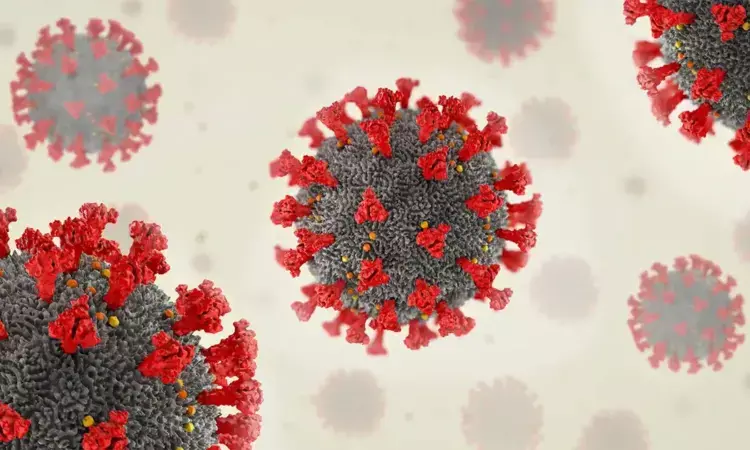- Home
- Medical news & Guidelines
- Anesthesiology
- Cardiology and CTVS
- Critical Care
- Dentistry
- Dermatology
- Diabetes and Endocrinology
- ENT
- Gastroenterology
- Medicine
- Nephrology
- Neurology
- Obstretics-Gynaecology
- Oncology
- Ophthalmology
- Orthopaedics
- Pediatrics-Neonatology
- Psychiatry
- Pulmonology
- Radiology
- Surgery
- Urology
- Laboratory Medicine
- Diet
- Nursing
- Paramedical
- Physiotherapy
- Health news
- Fact Check
- Bone Health Fact Check
- Brain Health Fact Check
- Cancer Related Fact Check
- Child Care Fact Check
- Dental and oral health fact check
- Diabetes and metabolic health fact check
- Diet and Nutrition Fact Check
- Eye and ENT Care Fact Check
- Fitness fact check
- Gut health fact check
- Heart health fact check
- Kidney health fact check
- Medical education fact check
- Men's health fact check
- Respiratory fact check
- Skin and hair care fact check
- Vaccine and Immunization fact check
- Women's health fact check
- AYUSH
- State News
- Andaman and Nicobar Islands
- Andhra Pradesh
- Arunachal Pradesh
- Assam
- Bihar
- Chandigarh
- Chattisgarh
- Dadra and Nagar Haveli
- Daman and Diu
- Delhi
- Goa
- Gujarat
- Haryana
- Himachal Pradesh
- Jammu & Kashmir
- Jharkhand
- Karnataka
- Kerala
- Ladakh
- Lakshadweep
- Madhya Pradesh
- Maharashtra
- Manipur
- Meghalaya
- Mizoram
- Nagaland
- Odisha
- Puducherry
- Punjab
- Rajasthan
- Sikkim
- Tamil Nadu
- Telangana
- Tripura
- Uttar Pradesh
- Uttrakhand
- West Bengal
- Medical Education
- Industry
Physical cause of tiredness experienced by patients with long-COVID found in new study

COVID-19 Case at SMCH Raises Concerns
Netherlands: A recent study published in Nature Communications has highlighted a biological cause of persistent fatigue in long-COVID patients.
According to researchers from Amsterdam UMC and Vrije Universiteit Amsterdam (VU) persistent fatigue in patients with long-COVID may be due to mitochondria in muscle cells that produce less energy than in healthy patients.
"We're seeing clear changes in the muscles in these patients," says Michèle van Vugt, Professor of Internal Medicine at Amsterdam UMC.
25 long-COVID patients and 21 healthy control participants participated in the study. They were asked to cycle for fifteen minutes. This cycling test caused a long-term worsening of symptoms in people with long-COVID, called post-exertional malaise (PEM). Extreme fatigue occurs after physical, cognitive, or emotional exertion beyond an unknown, individual threshold. The researchers looked at the blood and muscle tissue 1 week before the cycling test and 1 day after the test.
"We saw various abnormalities in the muscle tissue of the patients. At the cellular level, we saw that the mitochondria of the muscle, also known as the energy factories of the cell, function less well and that they produce less energy," says Rob Wüst, Assistant Professor at Department of Human Movement Sciences at the VU University. "So, the cause of the fatigue is really biological. The brain needs energy to think. Muscles need energy to move. This discovery means we can now start to research an appropriate treatment for those with long-COVID," adds van Vugt.
One of the theories about long-COVID is that coronavirus particles may remain in the body of people who have had the coronavirus. "We don't see any indications of this in the muscles at the moment," says Van Vugt. The researchers also saw that the heart and lungs functioned well in the patients. This means that the long-lasting effect on patient's fitness is not caused by abnormalities in the heart or lungs.
Exercising within your own limits
Exercising is not always good for patients with long-COVID. "In concrete terms, we advise these patients to guard their physical limits and not to exceed them. Think of light exertion that does not lead to worsening of the complaints. Walking is good, or riding an electric bike, to maintain some physical condition. Keep in mind that every patient has a different limit," says Brent Appelman, researcher at Amsterdam UMC. "Because symptoms can worsen after physical exertion, some classic forms of rehabilitation and physiotherapy are counterproductive for the recovery of these patients," van Vugt adds.
Long-COVID symptoms
Although the majority of people infected with the SARS-CoV-2 virus recover within weeks, a subgroup, estimated to be around one in eight, will get long-COVID. Symptoms in patients with long-COVID, post-acute sequelae or COVID or post-COVID syndrome (PCS) include severe cognitive problems (brain fog), fatigue, exercise intolerance, autonomic dysregulation, postural orthostatic tachycardia syndrome (POTS), orthostatic intolerance, and worsening of symptoms after PEM.
Reference:
Appelman, B., Charlton, B.T., Goulding, R.P. et al. Muscle abnormalities worsen after post-exertional malaise in long COVID. Nat Commun 15, 17 (2024). https://doi.org/10.1038/s41467-023-44432-3.
Dr Kamal Kant Kohli-MBBS, DTCD- a chest specialist with more than 30 years of practice and a flair for writing clinical articles, Dr Kamal Kant Kohli joined Medical Dialogues as a Chief Editor of Medical News. Besides writing articles, as an editor, he proofreads and verifies all the medical content published on Medical Dialogues including those coming from journals, studies,medical conferences,guidelines etc. Email: drkohli@medicaldialogues.in. Contact no. 011-43720751


